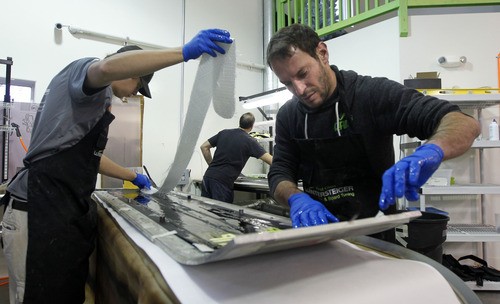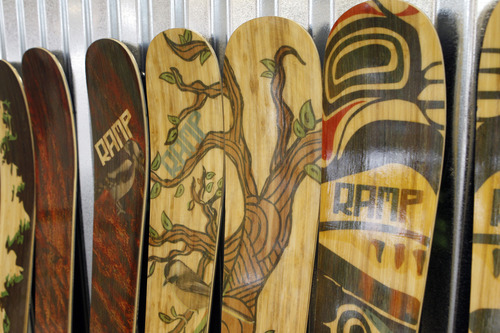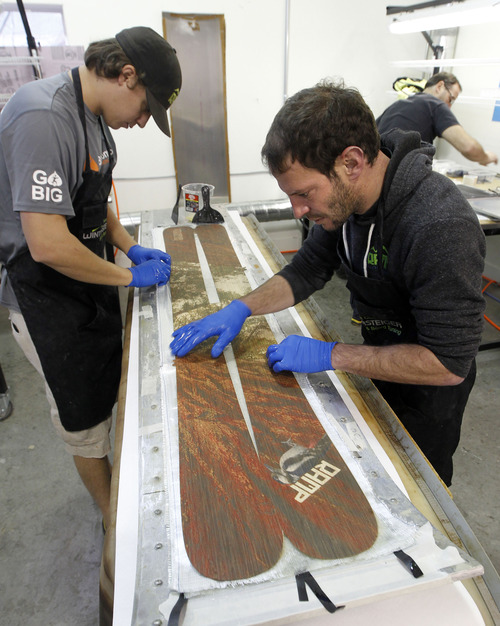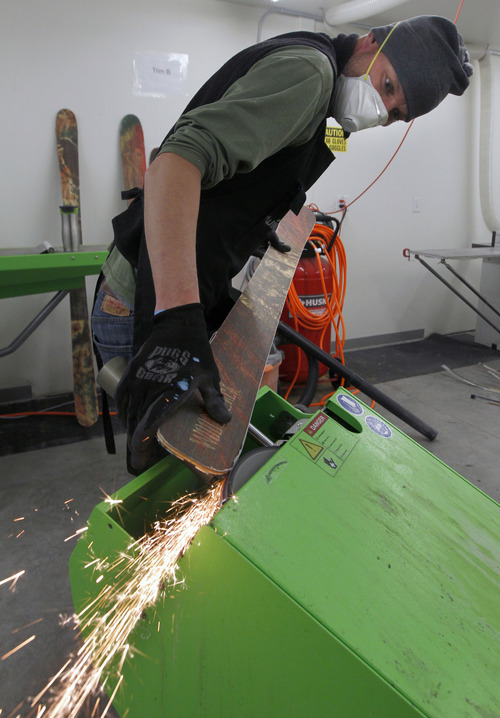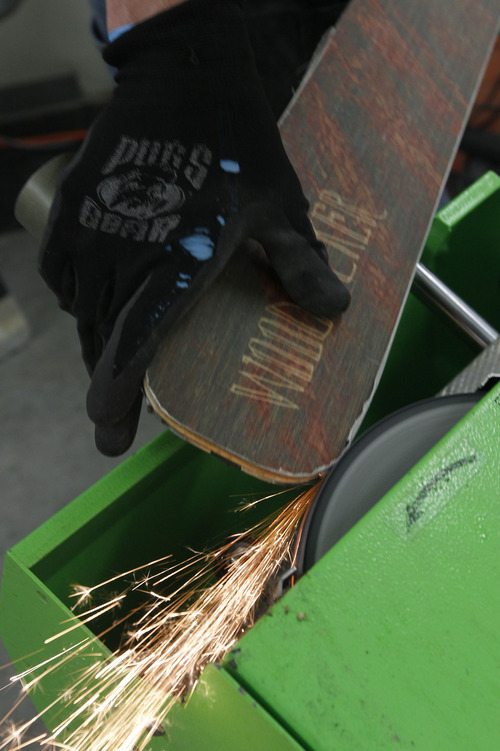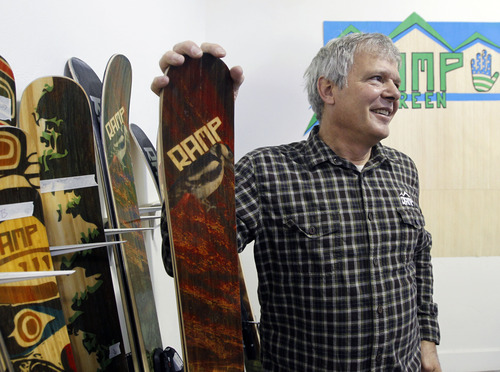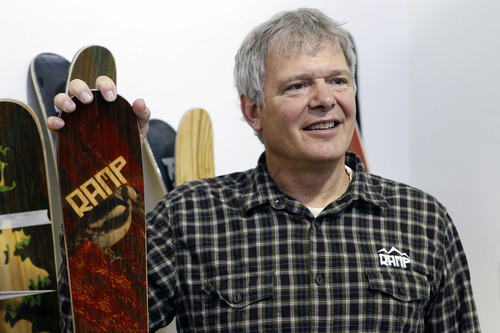This is an archived article that was published on sltrib.com in 2012, and information in the article may be outdated. It is provided only for personal research purposes and may not be reprinted.
Park City • The phrase "bulletproof" is a term companies love to hear attached to their products. And, increasingly, a "green" label associated with a business has provided a boost in sales.
By using materials in an unconventional way, RAMP Sports has found a way to combine the two and as a result is having a hard time keeping up with requests for its handmade skis.
Mike Kilchenstein started RAMP three years ago to pursue a lifelong dream after more than three decades of working with mega-ski producer Rossignol.
The first two production runs of RAMP skis and snowboards took place in Taiwan, but Kilchenstein wanted something closer to home.
RAMP secured a building near the junction of Interstate 80 and Highway 40 in Summit County on April 20. By May 25, after a scramble to get all the required machinery in place, RAMP produced its first made-in-the-USA skiable prototypes.
After several testing trips to Mount Hood in Oregon, Kilchenstein, RAMP production manager Evan Howard and ski engineer Christian Alary felt they had a solid model, and launched ski production from the Park City headquarters.
The crew at RAMP has been working nonstop since to keep up with demand.
"The only thing holding us back is our ability to produce more skis," Kilchenstein said. "They go right from our finish room to get shipped."
With a new company, Kilchenstein realized he could do things with his business model that other long-established ski enterprises could not.
He decided to focus on creating solid, good-looking skis and snowboards produced in an environmentally friendly way with a strong commitment to the consumer.
"Making skis and snowboards, and going skiing and snowboarding, is inherently not green. I'd be lying if I said making skis and snowboards was green. It is not," Kilchenstein said.
But for its part, in addition to using materials and production methods to reduce the impact on the environment, RAMP does little things, such as shipping the equipment to buyers in travel bags rather than boxes and providing a buy-back on skis when the consumer is done with them to find other uses.
RAMP also purchases 300 pounds of offsetting carbon emissions with each ski or snowboard sold.
RAMP, which stands for Riders Artists Musicians Project, is supported by a community of athletes, musicians, artists and actors, such as Luke Wilson, Brant Moles and the band Jane's Addiction, who support the mantra of environmentally friendly production of skis and snowboards.
One of the most notable relationships is with the Dave Matthews Band. RAMP gear has been displayed at the Eco-Village staged before the bands' concerts to promote environmentally responsible products.
Bamboo and Kevlar are two of the main components of the 10 adult and three youth ski models available from RAMP. Prices range from $570 to $999 for adult skis and from $199 to $425 for youth models. Consumers save 30 percent if they buy direct from the RAMP offices as opposed to ski shops or on the website, http://www.rampsports.com. Snowboards range from a direct-from-RAMP price of to $199 to $434.
Demos are available at the Park City headquarters or at various smaller ski shops around the country. Demo events are also scheduled throughout the season at U.S. resorts. Check the website for dates.
Kilchenstein said bamboo is much more durable and water resistant than the wood used in most skis, and that its combination with Kevlar — yes, the stuff used to make bulletproof vests — gives RAMP skis a distinctive feel on the slopes, whether groomed or those in the backcountry.
"Other companies say they use bamboo cores, but they are just bamboo strips mixed with poplar," Kilchenstein said. "The same is true of Kevlar. They use strands of Kevlar mixed with fiberglass. We are the only company I know of using full layers of bamboo and Kevlar."
RAMP staffers literally tested the bulletproof qualities of the skis by shooting them with a .22 rifle. They withstood that test, but Kilchenstein doubts the skis would hold up to a larger-caliber weapon.
"People are very excited to try out altogether different skis that make use of eco-friendly materials," said Tyler Knoles, the Western demo/technician representative for RAMP. "Overall feedback has been very positive about the ski's performance. People really like that RAMP has a ski for everyone, from the big mountain rippers, to baby boomers who want to ski groomers at Deer Valley, to kids and teens who spend all day in the [terrain] park. People also seem very excited about the fact that we are making these skis locally, right here in Park City. It allows them to feel a certain connection to the skis that you don't get with the bigger brands."
Lifelong skier Maddie McQueeney, 25, recently had a chance to test the skis on Teton Pass near her hometown of Jackson.
"I've always skied name-brand skis, so I was skeptical of the boutique, handmade RAMPs. My first turn on the Groundhogs erased any doubts I'd harbored," McQueeney said. "There's something to be said about skis handcrafted by people who truly understand the sport, with the ability to make adjustments to their presses in-house. RAMP has come out with a ski that carves effortlessly into hardpack and floats easily on soft powder, giving you the confidence to charge the mountain in any conditions, no matter your ability level."
Similar reviews have been turned in about the snowboards, which the company hopes to be producing in Park City in the near future.
Kilchenstein says he went through a process of trying to figure out the demographic of people who buy from RAMP, but gave up because he realized they didn't fit in traditional models.
"It was more than the 18-34-age-group kind of stuff. It is more like a mind-set. They seem to be nontraditional in that they are buying from a new company, from a website," he said. "They like the fact we have a green business model and they feel like we may have outsmarted the other companies a bit by providing a great product at a better value while doing it."
Quick facts about RAMP Sports
Business • Makes environmentally friendly skis and snowboards
Headquarters • Park City
No. of employees • 14
Where products are sold • Direct from headquarters, on the website at http://www.rampsports.com and at smaller ski shops
Price ranges • $199 to $999 for skis and $199 to $434 for snowboards


